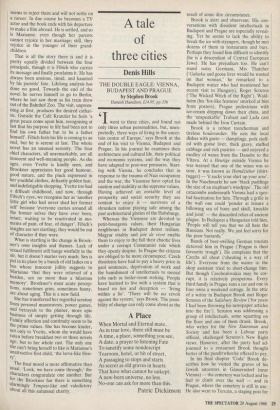Her novels now are ended?
Gabriele Annan
LATECOMERS by Anita Brookner
Cape, f10.95, pp.248
Hartmann and Fibich meet at an English boarding school just before the war. Both are refugee orphans from Ger- many. Hartmann is resilient, cheerful, attractive, 'innately festive'. Fibich is romantic-looking, but shy and neurotic. They spend the rest of their lives together, first setting up a greetings-card .business, then diversifying into copying machines. Hartmann marries a secretary from the office, handsome, complacent, mindless Yvette, absorbed in being soignee, selfish but benign, 'part glutton, part coquette': the kind of woman Brookner loves to hate. Fibich marries Christine, 'a shy, timid girl, awkward, self-effacing, not happy, but too modest even to register the fact'. She seems in line to be a typical Brookner heroine. But things do not meet one's primitive binary expectations; one would not wish that they should.
The two couples move from Compayne Gardens, NW6 to live one above the other in a mansion block in Ashley Gardens, SW1. Their office is in Farm Street, Wl. Like Elizabeth Bowen, Brookner is a London topographer. Wimbledon, Chelsea, Maida Vale, Notting Hill, lifeless Marylebone, each middle-class neighbour- hood is evoked without recourse to ponderous scene-setting, and each leans as heavily in upon the characters as the well- appointed, well-tended interiors where, carefully dressed, they consume extra- ordinary quantities of carefully prepared, delicious food. But this time the secluded milieu is explicitly Jewish: in the previous novels it only felt so. Not that Christine and Yvette are Jewish, and the word never occurs: but the Hartmanns' daughter Marianne briefly 'seems to find peace and ease in the complicated precepts of that old religion that was not even a memory for Hartmann and Fibich'. She is a docile, passive girl, and in spite of her prettiness and perfect grooming she marries reluc- tantly and as a last resort a dull young man from her father's office.
The quiet Fibichs, on the other hand, produce a boy of staggering beauty and ebullience. He is both a pride and a puzzle to them, and for a while a worry, when he seems to reject them and will not settle on a career. In due course he becomes a TV actor and the book ends with his departure to make a film abroad. He is settled, and so is Marianne, even though her parents cannot rejoice in her marriage; still, they rejoice in the younger of their grand- children.
That is all the story there is and it is pretty equally divided between the four principals, though it is Fibich who carries its message and finally proclaims it. He has always been anxious, timid, and haunted by his parents' fate. Lifelong analysis has done no good. Towards the end of the novel he nerves himself to go to Berlin, where he last saw them as his train drew out of the Bahnhof Zoo. The visit, unprom- ising at first, produces the desired cathar- sis. Outside the Café Kranzler he feels 'a great peace come upon him, recognising at last that his purpose in life had been not to find his own father but to be a father himself. Fibich feels his life is coming to an end, but he is serene at last. The whole novel has an unusual serenity. The four chief characters, all unremarkable, are all innocent and well-meaning people. As she ages, even Yvette is kindly seen, and Brookner appreciates her good humour, good nature, and the pluck expressed in her youthful clothes, defiantly golden hair, and indefatigable shopping. Yvette too had a difficult childhood, and now, through Fibich's eyes, we recognise her as 'another little girl who had never shed her former self' because 'everyone carries around all the former selves they have ever been, intact, waiting to be reactivated in mo- ments of pain, of fear, of danger'. Fibich's insights are not startling; they would be out of character if they were.
What is startling is the change in Brook- ner's own insights and themes. Lack of sexual fulfilment still hangs wistfully in the air, but it doesn't matter very much. Sex is put in its place by a bunch of old ladies on a bus whose innocent jollity suggests to Marianne 'that they were relieved of a burden, sex no more than a hilarious memory'. Brookner's most acute percep- tions, sometimes grim, sometimes funny, are about aging. This is a new field. She has transferred her regretful scrutiny from personal manoeuvres, power games, and betrayals to the plainer, more epic business of simply getting through life. Family affection and continuity seem to be the prime values. She has become kinder, not only to Yvette, whom she would have eaten before breakfast two or three novels ago, but to her whole cast. The only one she can't bring herself to like is Marianne's unattractive first child, 'the larva-like Hen- ry'.
The final mood is more affirmative than usual. 'Look, we have come through,' the characters congratulate one another. But for the Brookner fan there is something alarmingly Tempest-like and valedictory about all this autumnal charity.























































 Previous page
Previous page